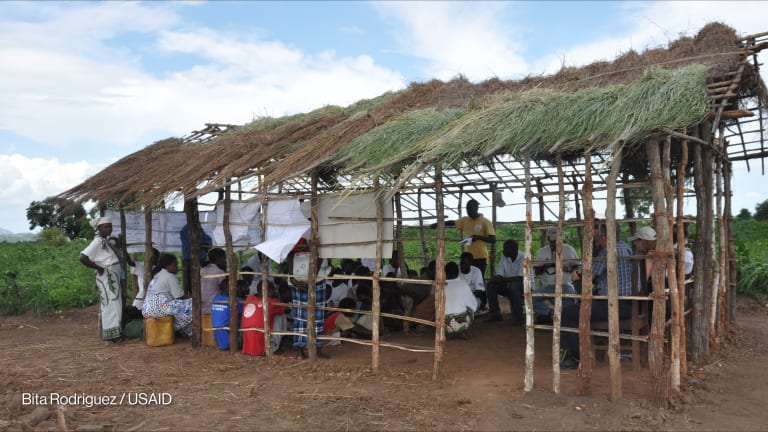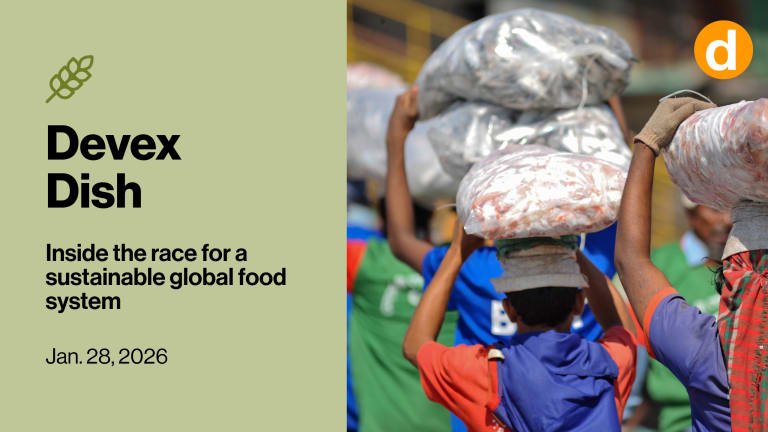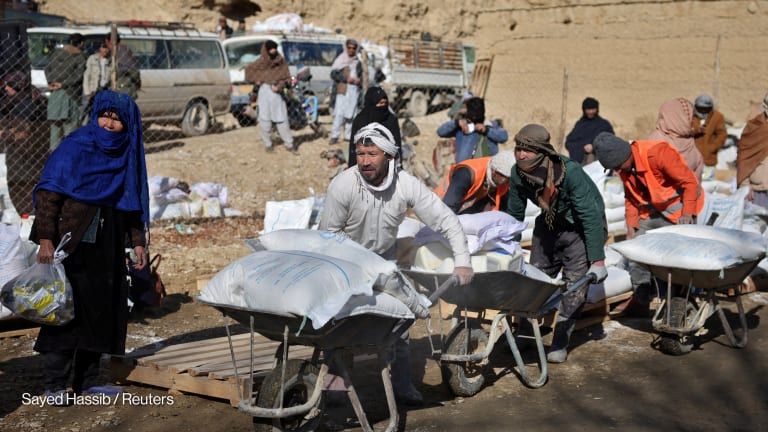Food crisis: MSF reports cycle of weakened immunity among children
Food shortages, lapsed vaccination programs, and a lack of clean water are all contributing to a child health emergency as malnutrition soars, says Médecins Sans Frontières' Karla Bil.
Children are becoming trapped in an ongoing cycle of malnutrition and illness linked to food shortages, lapsed vaccination programs, and a lack of clean water, according to Médecins Sans Frontières. Amid a growing food crisis, the number of malnourished children being admitted to MSF clinics in some parts of Africa has risen 150%, according to Karla Bil, MSF’s deputy medical director. The international NGO is scrambling to open more emergency clinics to respond to the crisis, but in many cases, relapse is inevitable as food shortages continue. Malnourished children are more susceptible to other diseases — a challenge compounded by the fact that many of them missed routine vaccinations during the pandemic, Bil said. Devex spoke to Bil about how MSF is seeing the impact of the food crisis in its programs, as part of a Devex Pro series on how aid organizations are responding to the crisis. The conversation has been edited for length and clarity. In what ways is the food crisis affecting your work? We do see a significant increase in children coming to our clinics who are severely malnourished, but also those who are moderately malnourished, who we try to treat as well. In 2021, we saw a 30% increase in the number of children being admitted into our facilities, which demonstrates a clear increasing nutrition crisis. Where are you seeing the biggest impact? We see a significant number of children who are severely malnourished in Somalia, Nigeria, South Sudan, Chad, CAR [Central African Republic], Yemen, Pakistan, and Afghanistan. For example, in Borno state, Nigeria, where we run two facilities, we are seeing more malnourished patients than at any time since the project began in 2017. From January to August of this year, admissions for inpatient treatment for malnutrition were up 150% on average compared to the year before. In one week in August, we admitted more patients than the whole month of August last year. Our programs focus on the under 5s, but we also see malnutrition in adults and specifically pregnant and lactating women, which also has an effect on the newborn child. Have you seen any secondary impacts? Malnutrition can lead to the immune system weakening, so children, but also other vulnerable groups, become more susceptible to other diseases. Then there is the secondary effect of the COVID-19 pandemic which led to a decrease in routine vaccination programs, and so if children are getting episodes of measles, they are more likely to become malnourished because their immune system is weakened … If we’re not careful, vaccinations could be a longer-term issue — this is something which needs to be addressed [by] working with ministries of health to ensure that populations, and children especially, are adequately vaccinated. Where needed, there should be catch-up campaigns for children born during COVID-19 who may not have been vaccinated. But this really requires multiple actors … The same thing applies to drought. You need water for agriculture but also for clean drinking water. If this is not there then children and others will get diarrhea, [and] this will lead to malnutrition. So there is a whole cycle and we see this in many of our missions — it is not just the food supply, we also need to increase the vaccination coverage, [provide clean] drinking water, hygiene, and sanitation. These are equally important components of the overall health situation and when one is lacking the others are usually lacking as well — it’s never a standalone problem. How are you responding? Where we get reports of pockets of high food insecurity, we do assessments and open emergency programs focusing on the vulnerable populations, such as children under 5. We have significantly increased our feeding programs in Somalia, Nigeria and Chad … At the moment, we are able to continue with our regular programs … and are recruiting new staff members for the newly-opened emergency programs. But because the needs are so overwhelmingly huge, we have to make difficult decisions and focus on the most urgent needs, while deprioritizing maybe the [work of] supplementing feeding to pregnant and lactating women.
Children are becoming trapped in an ongoing cycle of malnutrition and illness linked to food shortages, lapsed vaccination programs, and a lack of clean water, according to Médecins Sans Frontières.
Amid a growing food crisis, the number of malnourished children being admitted to MSF clinics in some parts of Africa has risen 150%, according to Karla Bil, MSF’s deputy medical director.
The international NGO is scrambling to open more emergency clinics to respond to the crisis, but in many cases, relapse is inevitable as food shortages continue. Malnourished children are more susceptible to other diseases — a challenge compounded by the fact that many of them missed routine vaccinations during the pandemic, Bil said.
This story is forDevex Promembers
Unlock this story now with a 15-day free trial of Devex Pro.
With a Devex Pro subscription you'll get access to deeper analysis and exclusive insights from our reporters and analysts.
Start my free trialRequest a group subscription Printing articles to share with others is a breach of our terms and conditions and copyright policy. Please use the sharing options on the left side of the article. Devex Pro members may share up to 10 articles per month using the Pro share tool ( ).
Sophie Edwards is a Devex Contributing Reporter covering global education, water and sanitation, and innovative financing, along with other topics. She has previously worked for NGOs, and the World Bank, and spent a number of years as a journalist for a regional newspaper in the U.K. She has a master's degree from the Institute of Development Studies and a bachelor's from Cambridge University.








